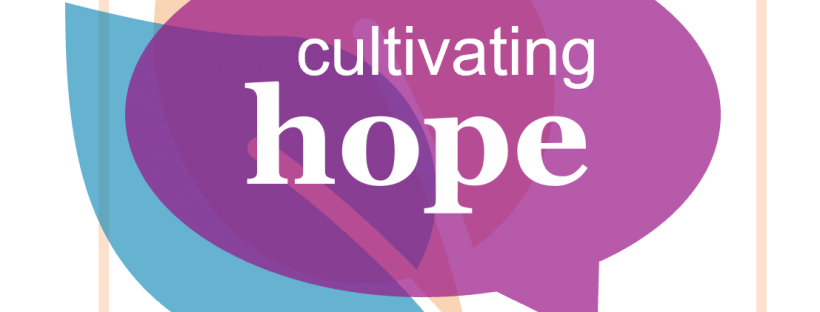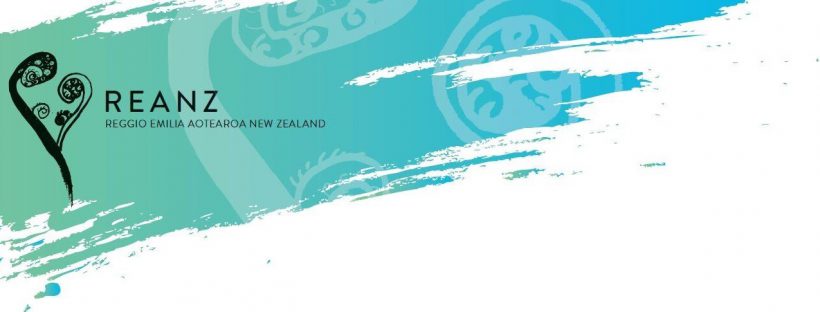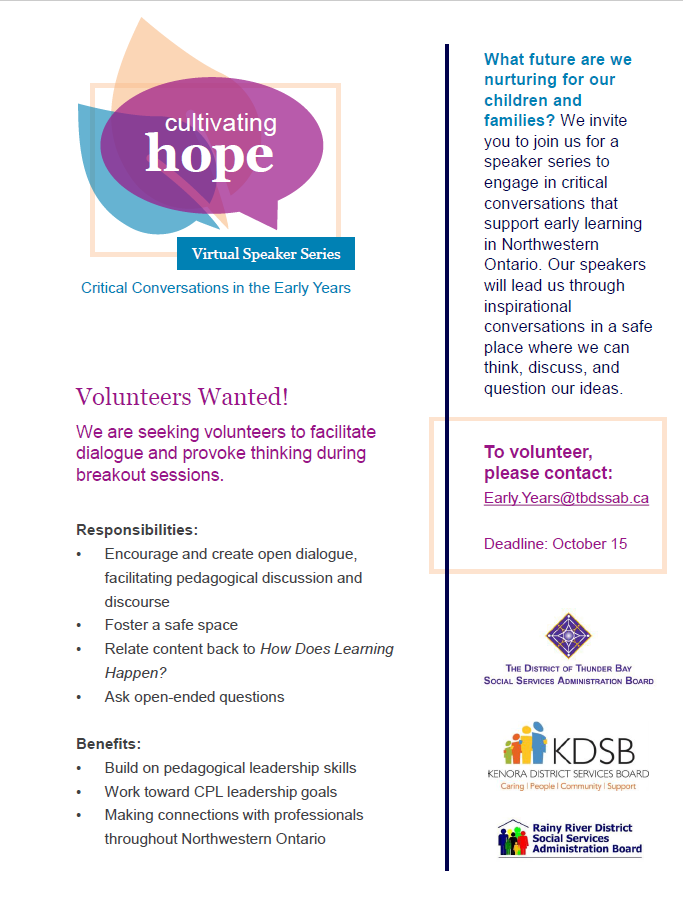
Category: Webinars
Save the Date!
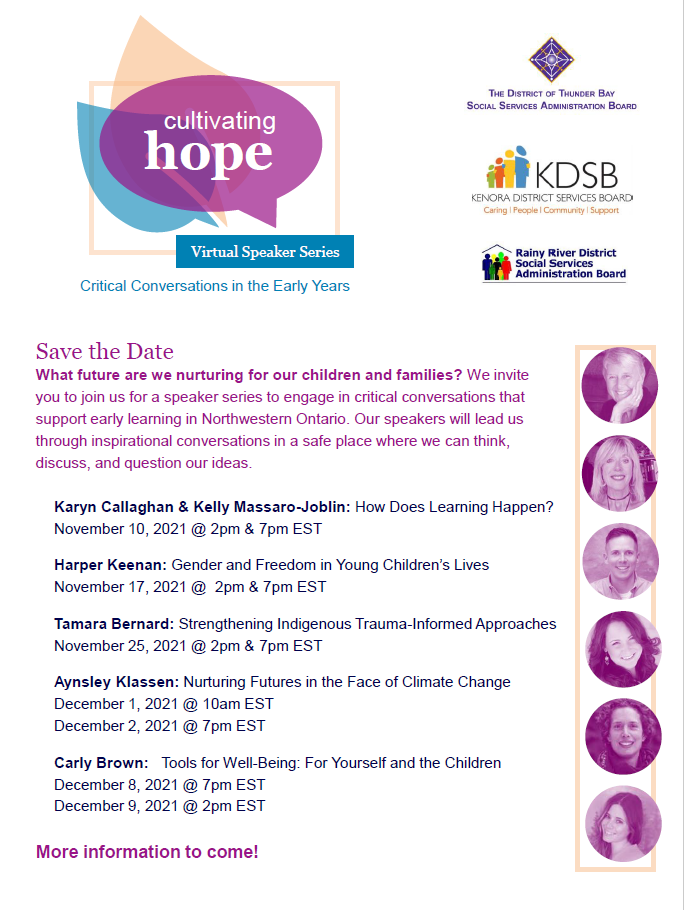
Save the Date: Cultivating Hope Virtual Speaker Series
What future are we nurturing for our children and families? We invite you to join us for a speaker series to engage in critical conversations that support early learning in Northwestern Ontario. Our speakers will lead us through inspirational conversations in a safe place where we can think, discuss, and question our ideas.
Karyn Callaghan & Kelly Massaro-Joblin: How Does Learning Happen?
November 10, 2021 @ 2pm & 7pm EST
Harper Keenan: Gender and Freedom in Young Children’s Lives
November 17, 2021 @ 2pm & 7pm EST
Tamara Bernard: Strengthening Indigenous Trauma-Informed Approaches
November 25, 2021 @ 2pm & 7pm EST
Aynsley Klassen: Nurturing Futures in the Face of Climate Change
December 1, 2021 @ 10am EST
December 2, 2021 @ 7pm EST
Carly Brown: Tools for Well-Being: For Yourself and the Children
December 8, 2021 @ 7pm EST
December 9, 2021 @ 2pm EST
More information to come!
The Courage to Listen Differently
“Listening is a complex state. It involves the abandoning of oneself as we come to know that we are only one being within this vast universe.”(CARLINA RINALDI, 2001)
The Reggio Emilia Aotearoa New Zealand (REANZ) has extended access to their free webinar about listening differently. This is part of a two-part series with the first webinar being available for three more months and the second webinar becoming available on August 30th.
These webinars are “an opportunity for educators to reflect on the critical role of listening and how this permeates the everyday choices we make when we work with children. Kirsty Liljegren and Fiona Zinn will draw on the thinking of the Reggio Emilia Approach alongside their personal perspectives which hold listening at the heart of practice” (REANZ, 2021).
You can access the first webinar here: https://www.reanz.org/events
Indigenous Knowledge Exchange- Food Sovereignty

The Indigenous Professional Learning Team is extending an invitation to early years professionals to attend an upcoming Knowledge Exchange Gathering.
September 22, 2021 from 2:00 pm – 3:30 pm EDT
This month Elders, Knowledge Keepers and early years professionals will share about the importance of Indigenous food sovereignty in relation to belonging, wellbeing, expression and engagement for children in the early years.
Click HERE to register by Monday September 20, 2021 at 4:00 pm EDT.
Indigenous Knowledge Exchange-Indigenous Song and Dance in the Early Years

The Indigenous Professional Learning Team is extending an invitation to early years professionals to attend our upcoming Knowledge Exchange Gathering.
July 21, 2020 from 2:00 pm – 3:30 pm EDT
This month Elders, Knowledge Keepers and early years professionals will share about the importance of Indigenous song and dance in relation to belonging, wellbeing, expression and engagement for children in the early years.
Be sure to register by Monday July 19, 2020 at 4:00 pm EDT.
Click HERE to register.
Beneath the Crescent Moon
We are excited to announce that Lori Huston will be sharing her graduating work from the Master of Education in Early Childhood Education program at UBC. Please e-mail us at early.years@tbdssab.ca to join us for this amazing learning opportunity.
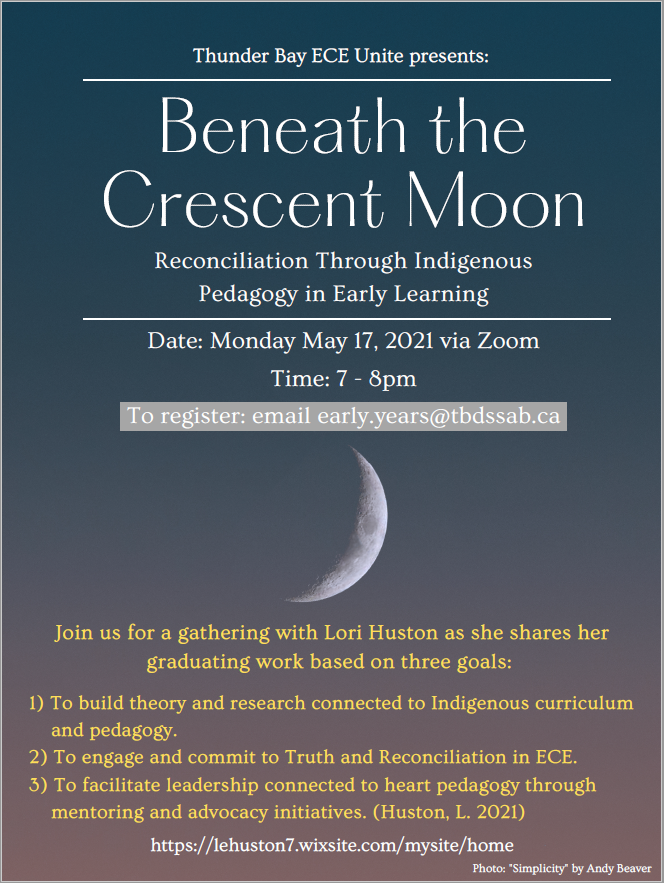
Pedagogical Documentation
We had a wonderful conversation last week about pedagogical documentation. Three educators joined us who each play a different role in our community – one educator in child care, one supervisor of a before and after school program, and one EarlyON coordinator. This diversity of experience made for a unique dialogue and the opportunity to share different perspectives. We all read the article, Curiosity, Curriculum, and Collaboration Entwined: Reflections on Pedagogical Documentationby Pat Tarr.
As we discussed the article, an interesting dialogue came up around interrupting children’s play. Traditionally, we have been taught to ask children open-ended questions – “what are you building?” “what do you think will happen when you stack another block on top?” We felt that this can sometimes interrupt and change the direction of children’s play, and we agreed that we should be thoughtful in deciding when is a good time to enter children’s play and ask questions. It was said that we need to give ourselves permission to take a step back and observe more.
As the conversation continued, we began thinking about how educators pick and choose what they feel is worth documenting. Tarr (2010) states in the article that “what we choose to document reveals and reflects back to us what we consider important, as well as help us to see ourselves as educators within the educational relationship” (p. 12). This conversation reminded some of us about another article by Pat Tarr that talked about ethics and biases in pedagogical documentation. We shared mixed feelings about this article, and some of us plan to dig a little deeper to decide if or how the information fits with our practice. You can access the article here: Reflections and Shadows: Ethical Issues in Pedagogical Documentation,.
Finally, one of the educators bravely shared her documentation with us. She wondered, “is this documentation?” There isn’t one right way to document children’s learning; taking time to practice documenting and experimenting with different techniques can help educators to feel more confident. We discussed our questions and curiosities about this documentation, and a new idea was shared about “stories from home” (Hedges, 2010). Essentially, “stories from home” is a form that goes home for families to fill out and share a story that took place with their child outside of the early learning setting – it’s getting the families to document!! We discussed that this would be a great way of getting to know children and families better, and building stronger connections between, for example, child care and home.
Let us know what you think about these ideas or about the articles provided in the chat below.
References
Hedges, H. (2010). Blurring the boundaries: Connecting research, practice and professional learning. Cambridge Journal of Education, 40(3), 299-314. http://dx.doi.org/10.1080/0305764X.2010.502884
Tarr, P. (2010). Curiosity, curriculum, and collaboration entwined: Reflections on pedagogical documentation. Canadian Children, 35(2), 10-14.
Tarr, P. (2011). Reflections and shadows: Ethical issues in pedagogical documentation. Canadian Children, 36(2), 11-16.
What story could you tell?
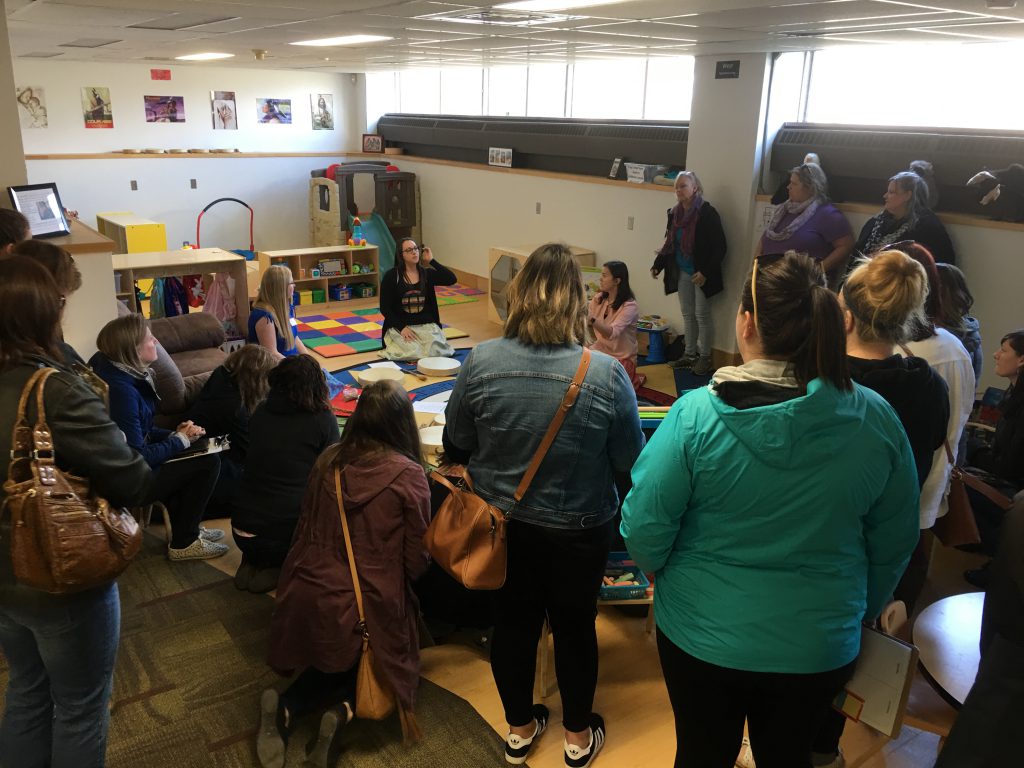
The District of Thunder Bay Social Services Administration Board recently offered a survey regarding staff well-being. Some of the feedback from this survey was to support staff through re-connecting and opportunities to support mental health.
We know that many of the staff working in child care and EarlyON programs in our communities have strengths and talents to inspire, showcase, and bring comfort to others. Do you or does your centre have a skill to share? A story to tell? Perhaps you have a colleague that has a gift that you recognize others should see. Whether it’s documentation, cooking, crafting, or storytelling, we would like to hear what you could share virtually among our community!
Submit your idea to us at early.years@tbdssab.ca
French Professional Learning
ECE Qualifications Upgrade Program
The ECE Qualifications Upgrade Program will be offering free webinars in English and French see HERE for more details.

